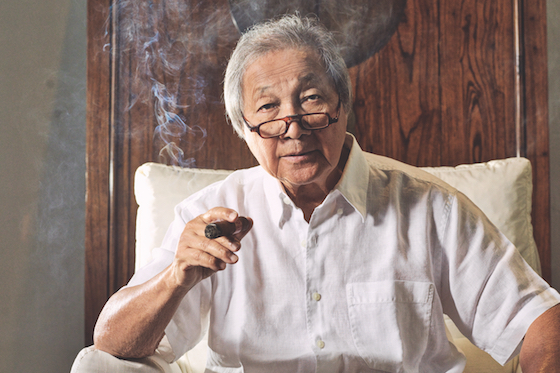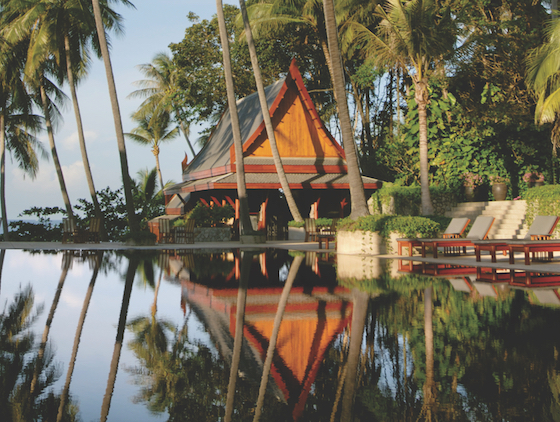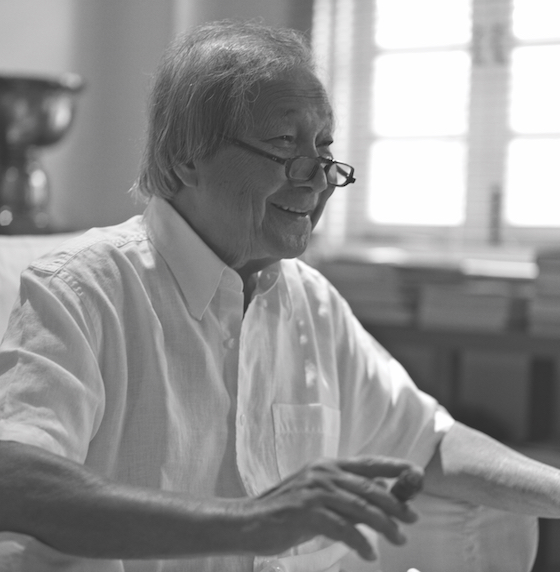Adrian Zecha’s father wanted him to become a doctor, so he majored in pre-med. He talked his way out of continuing and instead got a master’s degree in political science. After acing a civil service exam in his native Indonesia, he pivoted and became a journalist – against his father’s wishes – then a publisher. For a while, he was a retired publisher with a skiing habit.
He was many things before he became a hotel developer. But don’t call the 86-year-old a visionary. “He hates that word,” longtime associate Trina Dingler says.

“Why don’t you tell them that I am the luckiest guy in the world?” asks Zecha in a recent interview at his colonial-era home in Singapore. “I (always) say, I’m not very bright, but I’m not dumb, but I’m very, very lucky… Luck means you are given something that you never expected and never thought of – not that you were planning it.” He adds, “after that, of course, you have to work.”
Adrian Zecha, HOTELS 2019 Legend
A third element emerges – one that began with his grandfather on Java, who ran the family tea plantation and other ventures, and continued with his trader father, whose friendships established Zecha and his four brothers with U.S. educations. Relationships, and the connections that come with them, define Zecha’s career.
During a wide-ranging conversation flanked by iced tea and a couple of boxes of Cuban cigars, Zecha’s matter-of-fact discussion of his bona fides includes names like Rupert Murdoch, Henry Luce and Indonesian president Sukarno. His life story, so far, underlines the disparate experiences and creative ambitions that culminated in arguably the most envied and emulated luxury hotel brand, Amanresorts.
What separated Aman properties, says Dingler, the company’s former group executive director, was Zecha’s geographic literacy. “He was so well-traveled. He had seen so much as part of his own life that he was aware of places in the world. So if there was an opportunity, or there was a little window, we never had to really search for things because they seemed to somehow gravitate (to him).”
She and others point to his gift of visualizing the potential in a plot of land, along with avoiding replications among Aman properties, which eventually numbered 28 hotels in 18 countries before Zecha ended his association with the company in 2014.
Raymond Bickson, former CEO of Taj Hotel Group, was fresh out of hotel school in 1979 when he began working for Zecha at Regent International, another iconic brand Zecha helped develop. “He created this brand that (represented), I would say, a full circle lifestyle of living, eating, travel, culture, to a higher level. He raised the bar” with Aman, says Bickson, who today runs a hotel consultancy in New York. “He created something different.”

Building an icon
Many people know the story of Amanpuri, the Aman flagship in Phuket, Thailand, that started out in the mid-1980s as a second home for Zecha. (“I like second homes,” he says, despite the protestations of his wife, Bebe, that he travels too much to visit them. “Wives are more practical.”)
It took two years to find that property, through another connection, an old friend who was a cousin of Thailand’s former king. Zecha’s first impression was that it was pretty, but a “bit sinister.” A walk up a steep incline showed him the beach view that snapped the vision into place.
“I had to buy it piece by piece, by piece, by piece,” he remembers. That took another few years, but when he proposed building a few more vacation homes on the property, he got takers immediately among his friends.
He figured that if they built homes, his long-distance friends would want him to look after them. “So, why don’t I build a little club here?” he says. “Then I said, why a club? Why not a little hotel? I am not in the hotel business, so why not?”
That, simply, was the genesis of Aman. “Not a farsighted view of oh, my God, I can do something (to make a difference in) the industry,” Zecha says. “That is all fucking bullshit. I’m an ex-journalist, don’t forget. I hate exaggeration of any kind.” Eventually there were 19 Aman owners. “That was the luck part, but it required energy to actually put the whole deal together,” which took several more years, he says.
“If there’s anything I have contributed, I spot the sites. I still do that. I go and I find the sites. And then I imagine what I would like to see there,” Zecha says. “If other people happen to own their share, that’s fantastic. But I didn’t do it just because I think everybody’s going to love it. Oh, I love it. I want to do it.”
He says he still loves the Aman properties like his own children. Amid courtroom dramas regarding ownership, he eventually relinquished his share.
“(Amanpuri) opened to such accolades that we realized we had stumbled upon a business idea,” says Anil Thadani, a founding director on Amanresorts’ board and majority owner until he sold the business in 2009. He was one of the original villa owners, walking the property with Zecha. He describes Aman as a “lifestyle business.” “Adrian has an uncanny sense for what defines gracious living,” he says. “We designed and built the Amans to basically cater for a lifestyle that we wanted for ourselves – but clearly there were a lot of other people who loved that, too.”
Connected developer
His foray into the hotel business started, as usual, with a relationship: He was skiing in Europe after selling his publishing company when he was offered the opportunity in 1972, at age 39, to scout potential properties for Marriott in Asia. That was shortly after current Executive Chairman Bill Marriott had taken over.
“Just make the deals for us,” he was told. Through his connections, he found three – in Singapore, Hong Kong and Bangkok – but Marriott’s interest was derailed by the oil crisis of 1973, and a year later the relationship ended with no money changing hands.
Regent International hotels, founded in 1970 by Bob Burns, ex-Hilton, and joined by Georg Rafael, ex-InterContinental, became Zecha’s first hotel partners.
Zecha says he got his education at Regent doing the deal for the flagship Hong Kong property (IHG’s purchase of the Regent brand in mid-2018 includes returning that property, currently an InterContinental, back to its original branding.). But Rafael and Burns “get the credit for the fantastic reputation that Regent built,” he says. Rafael and Zecha eventually sold their shares to Burns in 1986, who sold to Four Seasons Hotels and Resorts in the ’90s.
“You can only admire his vision and creativity,” says Rafael, who continued a reciprocal relationship with Zecha on Amanresorts as he developed Rafael hotels; he now runs family investments out of Monaco and Hawaii. “He has always?consulted me a little bit and asked me for my view on what he was trying to do because we had this very good friendship. I think we were good partners.”
‘What’s the formula?’
Zecha’s definition of luxury – the “different” that Bickson cites regarding Aman – is easy to experience but tough to define. “I remember one time people asking, ‘Well, what’s the formula? What’s the model? What are the list of risks, the whole thing of what to do?’” Dingler recalls. “And (Zecha and I) looked at each other and said, ‘I don’t know. Do you know?’”
“I said, ‘if I ever see a manual, you’re going to get hit on the head with it,’” Zecha concurs. Why? “You give it your personality. I don’t want cookie-cutter everybody, or ‘he’s an Aman guy.’ I hate that. Because no Aman is alike.”
His hotels do have a few things in common. Zecha likens it to hardware – the physical space and amenities – and software – the service itself. “Which is more important? Well, that is ridiculous. What is that?” He claps. “That’s a clap. Which is more important? This hand or this hand? Come on. It is both.”
If hardware attracts first-time guests, it’s the software that keeps them coming back. He says he still hears from people about their first impressions of Amanpuri – and in one case, the myth that resulted from one employee randomly winding an orchid around the suitcase handle of a Condé Nast travel writer, who portrayed it as standard operating procedure for the then-new hotel. “That’s the software,” he says.
He continues an artisanal approach with his most recent brand, the 3-star Azerai, which has two properties open in Vietnam and a pipeline of nine signed hotels: “When I say affordable, everybody says, ‘but you’re downgrading it.’ No, I’m not.” He compares Aman and Azerai as being two models built by a single luxury carmarker. “The hardware product is smaller than Aman. The software product is the same. My goal is to have that same software, that same quality of the smile, of the attitude, as Aman. Because for me, that is actually the essence of the hospitality business.”
He remains busy and traveling, including a new project in California; he declines to say more, citing a dislike of the hyperbole that often comes with touting new properties, but points to his insistence on seeing potential sites himself.
Two things keep him going: “I smoke cigars,” he says. And he has a clear conscience. He would like to live to be 99 years old, and when friends ask him why he isn’t shooting for a round 100, he replies: “I negotiate deals all the time. And I’ve learned that if you go one step too far, you lose the deal.”

